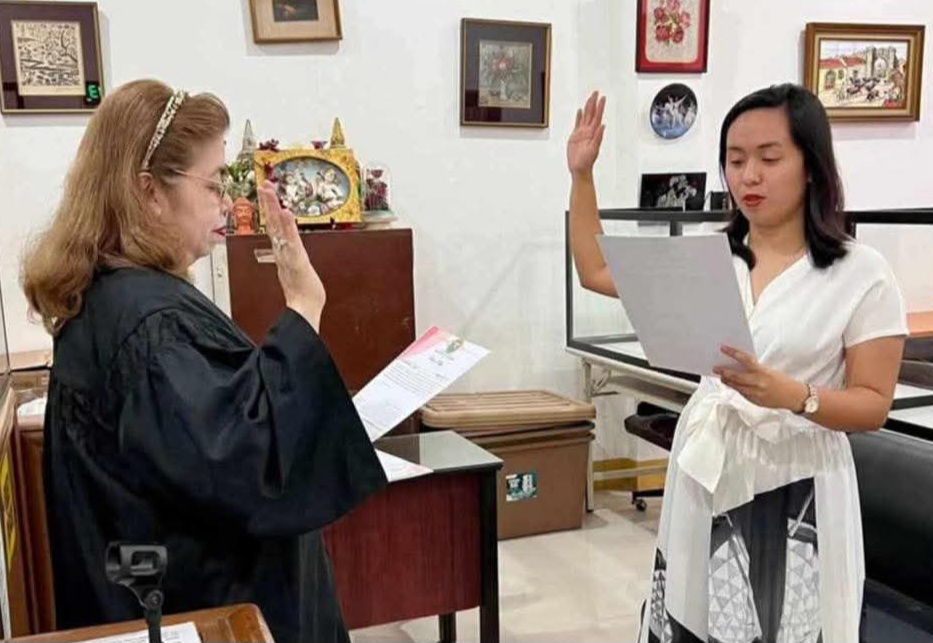by Miriam G. Desacada
Tacloban City–The Supreme Court en banc, acting on the petition for certiorari—by then candidate and now mayor-elect Mary Dominque (also known as DM) Oñate of Palompon, Leyte—ruled that the Comelec’s pre-election declaration of her as a nuisance candidate was done with grave abuse of discretion because it was based on “wrong and irrelevant considerations.”
In its 10-page resolution handed down on April 22, the High Court ruling disagrees with the Comelec declaration and set aside its two resolutions—one on Dec. 11, 2024 cancelling DM’s COC, and another on Dec. 20 denying her motion for reconsideration—and rendered them invalid and without legal effect.
The SC technically reverses the Comelec’s declaration of DM as nuisance, and made permanent its previously issued temporary restraining order (TRO) against the poll body.
ANTECEDENTS
DM Oñate and Arevalo were rival candidates for the mayoral post of Palompon, Leyte. DM was the official candidate of People’s Reform Party (PRP), while Arevalo was of Partido Federal ng Pilipinas (PFP). However, a week after the last day of filing of certificates of candidacies (COCs), Arevalo launched herself into attack mode: she petitioned Comelec to declare DM Oñate a nuisance candidate and cancel her COC.
Arevalo argued that DM lacked bona fide intent to run for the mayoral post for the following reasons: 1) DM has no political background to discharge his duties as an elected official; 2) DM had not demonstrated significant involvement in socio-civic or political activities; 3) DM’s candidacy was motivated only by personal reason—to vindicate her “dismissed” father from incumbency as mayor—rather than a genuine intent to serve the public.
DM fought back and countered: 1) she had bona fide intent to run for mayor; 2) aside from outstanding academic records, she joined socio-civic engagements, held positions in the student council, involved in projects and outreach programs, and joined social organizations; 3) she was nominated as official bet of PRP with complete slate of candidates; and 4) personal motivations are inherent in any decision to run for office, and are not contrary to a person’s commitment to serve.
Arevalo’s attack was aimed at DM’s statement in earlier media interviews where she was quoted as saying: “. . . her candidacy was driven by what her family viewed as ‘political persecution’ against her father (Mayor Ramon Oñate who got dismissed from office), and that she never wanted this (her candidacy). . .”
DM complained because she was incompletely quoted, misrepresenting of what she actually fully said. She then filled in the seemingly intentionally omitted words in her statement, as follows: “But sometimes, life calls us to fight battles we didn’t plan for. My father’s work in Palompon is not done, and I will see to it that his legacy is honored, not tarnished by those who owe him their positions.”
However, Comelec did not consider DM’s contention and heeded instead Arevalo’s words, thus the Comelec 1st Division issued a resolution declaring DM a nuisance and canceling her COC, months before election proper. Weeks after, she moved for reconsideration but the Comelec en banc upheld the first resolution against her.
UPHILL BATTLE TO VICTORY
Being technically out of the race, DM went to the Supreme Court where she filed a petition for certiorari assailing the Comelec resolution, arguing that it erred in relying on online articles posted without proper authorization from her. By then, she hoped the Court would somehow listen to her.
The SC did, and issued a TRO stopping the Comelec from taking DM’s name off the official ballot, ordering her reinstated in the ballot, and allowing her to continue with her candidacy, pending her petition.
DM got back on the racetrack and overcame what some may termed as a long shot onward to a convincing win against Arevalo. The neophyte in her got 23,144 votes against the veteran Arevalo who got 15,661 votes only.
For vice mayor, DM’s teammate Keith dela Calzada—son of the incumbent vice mayor—garnered 21,674 votes to win against Arevalo’s teammate, Lloyd Surigao, who only got 14,676 votes.
However, DM victory did not erase yet the stain on her candidacy haunted by a Comelec assertion branding her as nuisance, which in a way threatened also her electoral hurdle.
Soon after her proclamation, the SC settled the conundrum by issuing a ruling on DM petition for certiorari, which it described as meritorious because the Comelec’s reliance on the published article on DM’s comment “is grossly insufficient to show lack of bona fide intent to run for office–one of the primary grounds for declaring a candidate a nuisance under the Omnibus Election Code.
“Personal motivation is neither a legal qualification nor a ground for disqualification,” the Court emphasized, and criticized Comelec for injecting speculative reasoning into a matter that demands factual clarity and legal grounding.
The SC also said that “for as long as personal motivation is not illegal or immoral, it is not indicative of the absence of good faith to run for office, . . . the article merely mentioned what Oñate felt in the face of a perceived betrayal of her father—an ordinary human emotion.”
“Comelec’s conclusion on Oñate stems from selective reading of statements published online without due regard to the context of the article. Comelec has interwoven an incomplete story centering on political vengeance . . . a more holistic reading of the article shows a progression of Oñate’s initial motivation, culminating in her ultimate decision to run for office.”
It stated further: “The decision to run was borne from a sense of duty to her father and the people of Palompon . . . The article merely mentioned that Oñate intended to serve the people of Palompon by making a vow to continue the work started by her father.”
Citing constitutional and legal standards that protect the rights of individuals to seek public office, the Court ruled that the poll body’s action was both procedurally flawed and substantively unjustified.
It likewise serves as a stern reminder to the Comelec to strictly adhere to due process and established legal doctrines in handling disqualification cases.
Upon learning of the SC ruling, DM herself commented to the media: “Despite the threat of disqualification, I still won (in the election). The High Court is correct in its decision affirming that, at the end of the day, it is the people, not the Comelec, who decide on who will be the person they choose to be in office.”
Many Palomponganons, in random interviews with the media, as well as supporters of Oñate have welcomed the SC ruling, upon learning of it, calling it a “victory for democracy and equal political opportunity” that they said will benefit the people of Palompon. —Miriam G. Desacada

